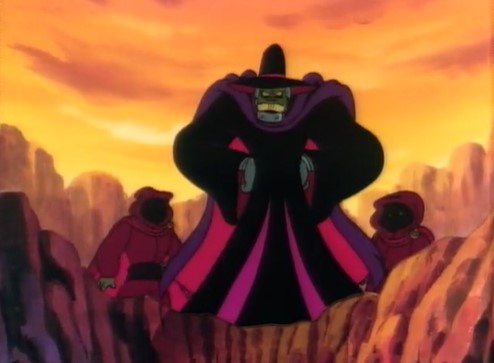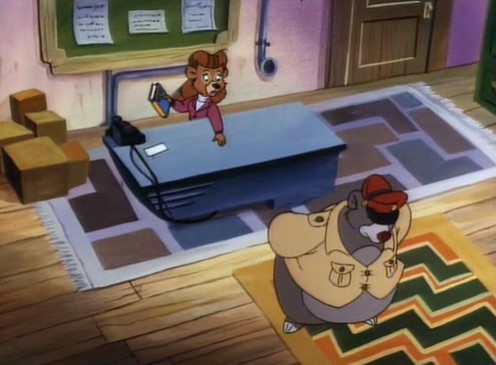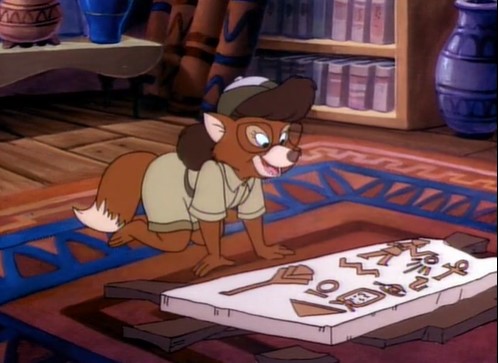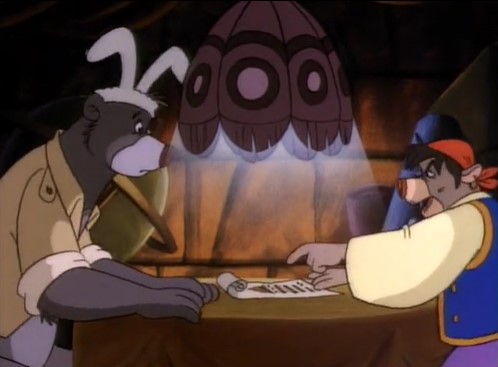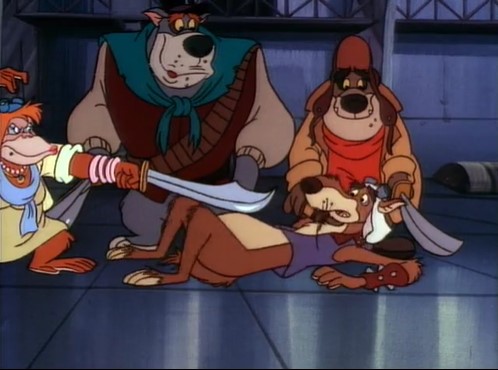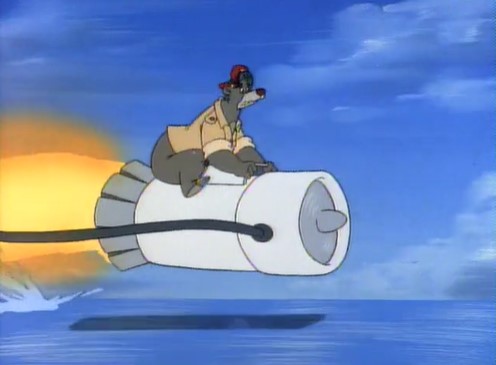Post by djnyr on Sept 25, 2022 15:47:19 GMT
Spin It! Part 5--Episodes
XLIV: "Captains Outrageous"
Kit sponsors his friend Oscar Vandersnoot for membership in the Jungle Aces Secret Midnight Club, a backyard boys’ club made up of young would-be aviators; however, each member must experience an adventure in order to join, and Oscar, who’s been carefully sheltered by his wealthy mother, is unable to meet this requirement. Kit hatches a plan to create an adventure for Oscar, by allowing him to accompany Baloo on a cargo run and encounter “air pirates” (to be portrayed by a disguised Kit and Wildcat); to add further spice to Oscar’s experience, Kit and Baloo allow him to think that the Sea Duck will be transporting a top-secret anti-pirate weapon (really a rigged-up propane tank) on this run, instead of merely vegetables. However, Don Karnage, whose men have been shadowing Oscar with plans for kidnapping and ransom, gets wind of the “secret weapon” and decides to pull off a “two for one” capture of the boy and the weapon, thus turning the faked pirate attack into a real one and involving Oscar in a much bigger and more dangerous adventure than Kit intended.

“Captains Outrageous” was edited by Karl Geurs and penned by the distinguished comic-book writer Jan Strnad, whose last contribution to the show was one of the seven “preview” episodes, the memorably dramatic “Stormy Weather.” “Outrageous” is much lighter in tone than “Weather,” but it’s still a very good episode, an entertaining comic adventure with lots of laughs but also some genuine thrills, and a very likable and well-handled guest character in the person of Oscar Vandersnoot. Despite the episode title’s allusion to Captains Courageous, Strnad does not make Oscar a spoiled brat in need of a sharp lesson, unlike Harvey Cheyne in both the book and movie versions of Courageous. Nor does he depict Oscar as exaggeratedly dorky or pathetic, unlike Doofus on Original Ducktales or Honker on Darkwing Duck, who were likable and could even be heroic, but who always remained caricatures to some extent, even when they were being heroic. Instead, Oscar, despite his stereotypical poor-little-rich-boy appearance (glasses, short pants, etc.) comes off as simply a normal kid, taking into account the circumstances of his sheltered upbringing. He’s shyer and more timid than average, but still has a natural childish sense of wonder and longing for adventure, which only needs encouragement to blossom. His ingrained timidity and suppressed adventurousness are both communicated by a variety of good verbal and visual touches—including his repeated question to Kit (“Was that an adventure?”) over the course of the episode, his resigned but wistful melancholy when the Jungle Aces turn him down (“If it was my club, I wouldn’t want me either”), his fascinated reaction to his first glimpse of the Sea Duck, and his initially terrified response to the Duck’s aerial stunts, which gradually subsides as Baloo cheerily reassures him.


As a result, Oscar’s eventual transformation from mild-mannered bystander to active hero, as he predictably but entertainingly saves the day after all hope seems lost, does not feel as arbitrary as such zero-to-hero arcs often do. Since he came off as genuinely human, instead of a mere caricature, in the earlier part of the episode, his turnabout fells not like a sudden metamorphosis but rather a believable possible development of his personality. It also feels right for him, despite his initial explosive entrance on the scene during the finale, to rely on his wits to defeat the pirates, tricking Karnage into a disastrous test of the “secret weapon”; in real life, your typical shy and withdrawn kid is often quite intelligent, and it makes more sense for Oscar to prevail in this fashion instead of improbably turning into a little tough guy. Incidentally, this is one episode that should be watched in the DVD version, if possible; many of the ToonDisney-derived prints floating around online cut out a few key shots of a box of matches which are utilized in Oscar’s climactic rescue of the other characters, making the scene partially incomprehensible. I’m not sure whether Disney Plus preserves the episode uncut or not.
Strnad’s writing deserves a lot of credit for the successfully non-cliched portrayal of Oscar, but, as in other child-centered Talespin episodes, the casting and voice work also is entitled to a share of the credit (as Matilda pointed out on her comments on “Flight of the Snow Duck”). Oscar is voiced by ten-year-old child actor Ben Ryan Ganger, whose mild and solemn delivery and slight speech impediment (he pronounces “r” as “w” on occasion) are perfectly suited to the character and helps immeasurably to help him feel like a real kid rather than a caricatured one. The leader of the Jungle Aces (a rather overbearing young hyena who’s unnamed here but will be dubbed “Ernie” in a later episode) and the other members of the club are also voiced by real children, in keeping with Magon’s usual excellent policy for casting juvenile roles.

The regular characters are as well-handled as guest-character Oscar is. Having Kit effectively act as Oscar’s big brother is a nice idea which feels consistent with Kit’s similar relationship with Molly in other episodes, and his energetic organization of the planned fake adventure is also a good example of his typically active and eager personality. Baloo’s interactions with Oscar are also very nicely characterized, with Baloo promptly awarding the youngster a “cool”-sounding nickname (“Slick”) and otherwise doing his affable best to help him loosen up and gain confidence; as in Baloo’s interactions with Molly, we see how easy it is for him to make friends with kids on an avuncular basis, uncomfortable though he is when forced to assume a more parental role (as in some of his interactions with Kit). Becky has less screen time, but her attitude to Kit’s whole fake-adventure scheme is also on point, with Kit convincing her to sponsor the scheme by pointing out the business advantages of befriending the wealthy Vandersnoot family, but Becky still responsibly insisting that Oscar’s mother must approve his accompanying Baloo on the cargo run. Wildcat has some nice bits too, getting rather confused as Kit rehearses the planned fake pirate attack and later, during the climactic action scene, calmly conducting repairs on the fly as the Sea Duck plunges dangerously towards the ocean.

Don Karnage makes his first appearance in the production order since “Plunder and Lightning,” and is at his insane and quotable best--treating his followers with his usual condescension (“Congratulations! You have not done a terrible job”), gleefully subjecting Kit and Wildcat to an eccentric form of “torture” (“You force me to do terrible things I enjoy doing anyway!”), and introducing himself with in grandiose but mangled phraseology (“Miserable Baloo-type person! It is me, my glorious self, Don Karnage!”). Strnad doesn’t just use Karnage’s egoism for comedic effect, however; he also ties it neatly into the plot, with Karnage’s eventual defeat occurring partly because Oscar is able to convince the pirate chief that only Karnage himself should be privy to the “secret” of the anti-pirate weapon, causing Karnage to order his crew to stand down at what proves to be a critical moment.

Appropriately for an episode centered on a character discovering the thrill of aerial adventure, the airborne action scenes in “Outrageous” are exhilarating, from the Sea Duck’s energetic looping and rolling as Baloo puts her through her paces for Oscar’s benefit to the more serious chase sequence mid-way through the episode, with the Sea Duck being pursued by the pirates’ planes through the skies and into an ominous cave/tunnel. Best of all is the climactic action scene, with the Sea Duck and Oscar separately plummeting towards the ocean as Baloo tugs on the controls with increasing desperation, Wildcat works to get the stalled plane restarted, and Kit does some emergency cloud-surfing in order to rescue Oscar. As in other standout action/suspense sequences on Talespin (like the climactic mid-air rescues in “Mommy for a Day”,“It Came from Beneath the Sea Duck”, and “Plunder and Lightning”), the editing and especially the music play a big part in making the climax of “Outrageous” feel properly urgent and dramatic. The musical score is also used to excellent effect earlier in the episode during Oscar's first flight on the Duck, creating a soaring, exuberant sensation.

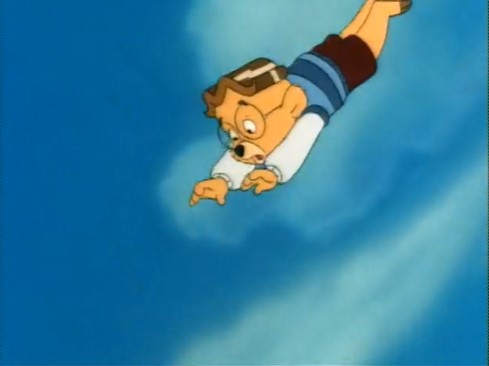


At the risk of belaboring a point I’ve already made several other times in this series of reviews, the great strength of “Captains Outrageous” is one of the greatest strengths of Talespin as a whole, in that it humorously but sincerely employs a tried-and-true storytelling device (in this case, the emergence of a sheltered youngster from his shell in the face of danger) and adapts it to the particular needs of the Cape Suzette world—tailoring the tale to the quirks of the regular characters (Baloo, Kit, Karnage) and thus making an old story feel fun and fresh, without any self-aware riffing or snarky “subversion” of expectations.
Up Next: "For Whom the Bell Klangs"
XLIV: "Captains Outrageous"
Kit sponsors his friend Oscar Vandersnoot for membership in the Jungle Aces Secret Midnight Club, a backyard boys’ club made up of young would-be aviators; however, each member must experience an adventure in order to join, and Oscar, who’s been carefully sheltered by his wealthy mother, is unable to meet this requirement. Kit hatches a plan to create an adventure for Oscar, by allowing him to accompany Baloo on a cargo run and encounter “air pirates” (to be portrayed by a disguised Kit and Wildcat); to add further spice to Oscar’s experience, Kit and Baloo allow him to think that the Sea Duck will be transporting a top-secret anti-pirate weapon (really a rigged-up propane tank) on this run, instead of merely vegetables. However, Don Karnage, whose men have been shadowing Oscar with plans for kidnapping and ransom, gets wind of the “secret weapon” and decides to pull off a “two for one” capture of the boy and the weapon, thus turning the faked pirate attack into a real one and involving Oscar in a much bigger and more dangerous adventure than Kit intended.

“Captains Outrageous” was edited by Karl Geurs and penned by the distinguished comic-book writer Jan Strnad, whose last contribution to the show was one of the seven “preview” episodes, the memorably dramatic “Stormy Weather.” “Outrageous” is much lighter in tone than “Weather,” but it’s still a very good episode, an entertaining comic adventure with lots of laughs but also some genuine thrills, and a very likable and well-handled guest character in the person of Oscar Vandersnoot. Despite the episode title’s allusion to Captains Courageous, Strnad does not make Oscar a spoiled brat in need of a sharp lesson, unlike Harvey Cheyne in both the book and movie versions of Courageous. Nor does he depict Oscar as exaggeratedly dorky or pathetic, unlike Doofus on Original Ducktales or Honker on Darkwing Duck, who were likable and could even be heroic, but who always remained caricatures to some extent, even when they were being heroic. Instead, Oscar, despite his stereotypical poor-little-rich-boy appearance (glasses, short pants, etc.) comes off as simply a normal kid, taking into account the circumstances of his sheltered upbringing. He’s shyer and more timid than average, but still has a natural childish sense of wonder and longing for adventure, which only needs encouragement to blossom. His ingrained timidity and suppressed adventurousness are both communicated by a variety of good verbal and visual touches—including his repeated question to Kit (“Was that an adventure?”) over the course of the episode, his resigned but wistful melancholy when the Jungle Aces turn him down (“If it was my club, I wouldn’t want me either”), his fascinated reaction to his first glimpse of the Sea Duck, and his initially terrified response to the Duck’s aerial stunts, which gradually subsides as Baloo cheerily reassures him.


As a result, Oscar’s eventual transformation from mild-mannered bystander to active hero, as he predictably but entertainingly saves the day after all hope seems lost, does not feel as arbitrary as such zero-to-hero arcs often do. Since he came off as genuinely human, instead of a mere caricature, in the earlier part of the episode, his turnabout fells not like a sudden metamorphosis but rather a believable possible development of his personality. It also feels right for him, despite his initial explosive entrance on the scene during the finale, to rely on his wits to defeat the pirates, tricking Karnage into a disastrous test of the “secret weapon”; in real life, your typical shy and withdrawn kid is often quite intelligent, and it makes more sense for Oscar to prevail in this fashion instead of improbably turning into a little tough guy. Incidentally, this is one episode that should be watched in the DVD version, if possible; many of the ToonDisney-derived prints floating around online cut out a few key shots of a box of matches which are utilized in Oscar’s climactic rescue of the other characters, making the scene partially incomprehensible. I’m not sure whether Disney Plus preserves the episode uncut or not.
Strnad’s writing deserves a lot of credit for the successfully non-cliched portrayal of Oscar, but, as in other child-centered Talespin episodes, the casting and voice work also is entitled to a share of the credit (as Matilda pointed out on her comments on “Flight of the Snow Duck”). Oscar is voiced by ten-year-old child actor Ben Ryan Ganger, whose mild and solemn delivery and slight speech impediment (he pronounces “r” as “w” on occasion) are perfectly suited to the character and helps immeasurably to help him feel like a real kid rather than a caricatured one. The leader of the Jungle Aces (a rather overbearing young hyena who’s unnamed here but will be dubbed “Ernie” in a later episode) and the other members of the club are also voiced by real children, in keeping with Magon’s usual excellent policy for casting juvenile roles.

The regular characters are as well-handled as guest-character Oscar is. Having Kit effectively act as Oscar’s big brother is a nice idea which feels consistent with Kit’s similar relationship with Molly in other episodes, and his energetic organization of the planned fake adventure is also a good example of his typically active and eager personality. Baloo’s interactions with Oscar are also very nicely characterized, with Baloo promptly awarding the youngster a “cool”-sounding nickname (“Slick”) and otherwise doing his affable best to help him loosen up and gain confidence; as in Baloo’s interactions with Molly, we see how easy it is for him to make friends with kids on an avuncular basis, uncomfortable though he is when forced to assume a more parental role (as in some of his interactions with Kit). Becky has less screen time, but her attitude to Kit’s whole fake-adventure scheme is also on point, with Kit convincing her to sponsor the scheme by pointing out the business advantages of befriending the wealthy Vandersnoot family, but Becky still responsibly insisting that Oscar’s mother must approve his accompanying Baloo on the cargo run. Wildcat has some nice bits too, getting rather confused as Kit rehearses the planned fake pirate attack and later, during the climactic action scene, calmly conducting repairs on the fly as the Sea Duck plunges dangerously towards the ocean.

Don Karnage makes his first appearance in the production order since “Plunder and Lightning,” and is at his insane and quotable best--treating his followers with his usual condescension (“Congratulations! You have not done a terrible job”), gleefully subjecting Kit and Wildcat to an eccentric form of “torture” (“You force me to do terrible things I enjoy doing anyway!”), and introducing himself with in grandiose but mangled phraseology (“Miserable Baloo-type person! It is me, my glorious self, Don Karnage!”). Strnad doesn’t just use Karnage’s egoism for comedic effect, however; he also ties it neatly into the plot, with Karnage’s eventual defeat occurring partly because Oscar is able to convince the pirate chief that only Karnage himself should be privy to the “secret” of the anti-pirate weapon, causing Karnage to order his crew to stand down at what proves to be a critical moment.

Appropriately for an episode centered on a character discovering the thrill of aerial adventure, the airborne action scenes in “Outrageous” are exhilarating, from the Sea Duck’s energetic looping and rolling as Baloo puts her through her paces for Oscar’s benefit to the more serious chase sequence mid-way through the episode, with the Sea Duck being pursued by the pirates’ planes through the skies and into an ominous cave/tunnel. Best of all is the climactic action scene, with the Sea Duck and Oscar separately plummeting towards the ocean as Baloo tugs on the controls with increasing desperation, Wildcat works to get the stalled plane restarted, and Kit does some emergency cloud-surfing in order to rescue Oscar. As in other standout action/suspense sequences on Talespin (like the climactic mid-air rescues in “Mommy for a Day”,“It Came from Beneath the Sea Duck”, and “Plunder and Lightning”), the editing and especially the music play a big part in making the climax of “Outrageous” feel properly urgent and dramatic. The musical score is also used to excellent effect earlier in the episode during Oscar's first flight on the Duck, creating a soaring, exuberant sensation.




At the risk of belaboring a point I’ve already made several other times in this series of reviews, the great strength of “Captains Outrageous” is one of the greatest strengths of Talespin as a whole, in that it humorously but sincerely employs a tried-and-true storytelling device (in this case, the emergence of a sheltered youngster from his shell in the face of danger) and adapts it to the particular needs of the Cape Suzette world—tailoring the tale to the quirks of the regular characters (Baloo, Kit, Karnage) and thus making an old story feel fun and fresh, without any self-aware riffing or snarky “subversion” of expectations.
Up Next: "For Whom the Bell Klangs"












